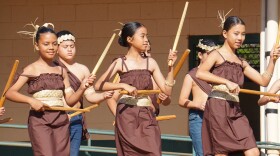A new school year starts in two weeks. But the effects of the pandemic will still be seen among students.
"A lot of fights. A lot of attacks on our staff. A lot of destruction to property," said Paula Fitzell, executive director of After-School All-Stars.
Fitzell's organization offers free after-school programs at 11 public intermediate and middle schools on Oʻahu and Hawaiʻi Island. Her program primarily operates in Title 1 schools, which is a federal program offering financial assistance to schools with high numbers of children from low-income families.
New data from the National Center for Education Statistics found classroom disruptions and illicit behaviors rose among students last year — likely one effect of the pandemic. Fitzell acknowledges behaviors, such as inappropriate touching, were more widespread than in years prior to the pandemic.
"They literally didn't know how to socialize with each other. They're crying out for just some human contact, and they're finding it hard to engage with their peers," Fitzell told HPR.
Fitzell's organization is one of many after-school programs based in public schools that support students and their families. Prior to the pandemic, these programs provided numerous benefits.
"They help students with academic improvement, working on reading and math skills," said Paula Adams, executive director of the Hawai'i Afterschool Alliance. "They engage youth in learning, and they help with school attendance. They prevent youth violence."
The state Department of Education sees after-school, or out-of-school-time, programs as a key piece in helping address the effects of the pandemic — academically, socially, and emotionally.
"It's sort of a double dose for students who are struggling," said Marissa Akui, director of the DOE's community engagement branch — which oversees after-school programs at public schools. "They provide time for social interaction for students who are not offered that during the in-school time. And just letting kids hang out, play and be together in a structured environment has been important after two years of their isolation."
But funding remains a challenge for these programs. A number of after-school programs receive support from private and public funding. However, they are largely supported through state and federal grants and other programs.
Fitzell tells HPR her organization is structured to meet grant requirements, but the support is usually not enough.
"Through [the Lowey 21st Century Community Learning Centers program], we get $700 per quarter of our school population. Now that's for a year," Fitzell said. "We have affiliates in other organizations in other states, they get up to $3,000 a year for a kid for the same thing... in a program not as comprehensive as ours."
Akui says her branch manages state and federal funds for these programs, but there are other streams at the department — specifically within school complex areas.
She tells HPR these programs received a big boost in funds related to American Rescue Plan Act, injecting millions of dollars.
However, there are concerns federal funding may dwindle once pandemic relief programs close. Adams says an increase in state funding can make these programs more sustainable.
"That funding would allow programs to provide more programming to plan for the years to come," said Adams. "Especially when the federal dollars will be used."
The state Legislature considered two proposals that would have allocated $6 million for after-school programs, matching federal funds. However, both bills did not advance past the House.
In the meantime, Fitzell says she's looking forward to the new school year. But she anticipates a greater need.
"I expect a very busy year. I expect much more kids than we've ever had. I expect much more serious, sometimes, difficulties. But if we can continue to kind of ride through it, great programs and great possibilities."







